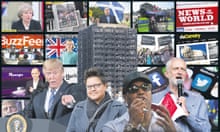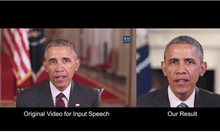In May I asked readers for feedback on a draft definition of fake news, a term easily manipulated to undermine trust in the journalism on which all democratic societies depend.
One strand among the responses suggested that for some people there is little to distinguish fake news from flawed journalism. If that is a widespread view, professional journalists – and other people who want an informed electorate and reasoned public debate – need to consider the implications.
Three recent reports, each excellent in its way, provide some nourishment, though their flavour varies.
Among other trends, the UK media regulator Ofcom, in its “News consumption in the UK: 2016”, charts the growth of social media as a preferred source of news, especially among young people. “Digital News Report 2017”, by the Reuters Institute for the Study of Journalism at Oxford University, pays attention to the trust issue in its analysis of 70,000 responses to an online survey in 36 countries. And the Oxford Internet Institute’s “Social Media and News Sources during the 2017 UK General Election” distils some conclusions from almost 2.5m tweets collected late in the recent campaign.
Taken together, the reports indicate that big change is afoot, and they merit more discussion than one column allows, but a few excerpts will give readers a sense of what is at stake and of how the Guardian is faring. But first, caveats: the reports cover much more than these Guardian-specific elements; excerpts necessarily omit context; the methodologies differ; sample sizes vary greatly; and, in the UK, the BBC is by far the single most important news source.
Ofcom asked UK newspaper readers how they rated their preferred news source on six attributes, and the Guardian/Observer scored highest on all but one trait among printed newspapers and highest on all six for the Guardian/Observer website or app:
Accurate and reliable – 80% print, 72% website or app.
Trustworthy – 83%, 73%.
Impartial and unbiased – 53% (54% among print Daily/Sunday Telegraph readers), 55%.
Offers range of opinions – 79%, 64%.
Helps me make up my mind – 65%, 66%.
Is of high quality – 82%, 79%.
This does not measure respondents’ confidence in the Guardian relative to other titles those same respondents may read. It tells you that regular Guardian readers seem to place higher levels of reliance on its journalism than readers of other titles appear to place on their preferred source.
The Reuters Institute asked about people’s perception of four key attributes of online news consumption: accuracy and reliability; helping with understanding complex issues; communicating strong viewpoints and opinions; and providing amusing and entertaining content. Its report says: “Looking at the BBC in the UK we can see that two-thirds of its users (70%) think it is ‘best for’ accurate and reliable news but only 28% think it’s good at amusing or entertaining. Less than a quarter of Guardian readers (21%) think it is best for reliable news (because the BBC plays that role for many), but almost half (45%) value it for opinion and viewpoints.”
Both the Reuters Institute and the Oxford Internet Institute (OII) team acknowledge the difficulty of defining fake news, and in their different ways conclude that – notwithstanding the growth in social media – the bulk of the news that people consume comes from mainstream media. Among those 2.5m UK election-related tweets that OII assessed, 53.6% of the content shared was from professional news organisations. But 31.6% was what the authors called “junk news”, which included “propaganda and ideologically extreme, hyper-partisan, or conspiratorial political news and information”.
OII reported that: “Within the professional news content that was shared, the BBC was most popular, with 22.7% of professional news coming from this source … followed by the Guardian with 17.7% of links directing to the newspaper’s website.”
The OII concluded in part: “In comparison to trends in other countries, we find that UK users shared better-quality information than that which many US users shared during the 2016 US election, but worse-quality news and information than was shared during the French 2017 election.”
Looking ahead to the German election in September and beyond, let’s hope that the growing focus on the problem of fake news will stem its pernicious effects, and that maintaining trust in the information sources on which public decision-making depends will receive the attention it requires.
Reuters Institute, which was interested in trust, political polarisation and perceived media bias, said in part: “Across all of our countries we see a similar pattern to last year, with trust highest in affluent Northern European and Scandinavian countries as well as Portugal and Brazil. Once again Central, Southern, and Eastern European countries tend to be at the other end of the scale, along with some Asian countries where media are considered to be too close to government. In Greece and South Korea less than a quarter of respondents (23%) agreed that you could trust the news most of the time.”
These are the Reuters Institute summaries of the trust issue for Germany and for the three countries where the Guardian has editorial operations supporting its reach to about 140 million unique browsers a month around the globe:
Germany
“About half of the Germans trust most news most of the time and it is widely felt to be free of political and commercial influence. Trust in the news is higher than in many countries [seventh-highest out of 36 countries] but the media have increasingly come under criticism from the far right in particular for withholding news that might embarrass the corporatist consensus.”
UK
“There has been a significant fall in those who agree that the news can be trusted (from 50% to 43% in the past 12 months) with under-35s particularly distrustful. Much of this may be related to the use of social media where only 18% say that social media can be trusted to separate fact from fiction, compared with 41% for news brands.” On trust in news, the UK ranks 17th of 36 countries.
US
“Following the presidential election, many publicly voiced concern about the spread of false information online, highlighting the value of professional journalism. Perhaps as a consequence, trust in news increased in the US (to 38%). While still low compared to other countries [28th of 36], Americans reported markedly higher trust in the news sources they themselves use (53%).”
Australia
The level of general trust in news media has remained relatively stable at 42% [19th of 36]. Over half (56%) of Australian respondents try to avoid the news either sometimes, often or occasionally. Women avoid news more often than men. A key reason provided for this avoidance by our respondents is that news can have a negative impact on mood.”
![Newsbill featuring a Guardian advert, no date [c1970s]](https://i.guim.co.uk/img/media/31b9aeb3fe66b4c06d324307e24d4c0563bc3645/0_0_2560_1536/master/2560.jpg?width=465&dpr=1&s=none)








